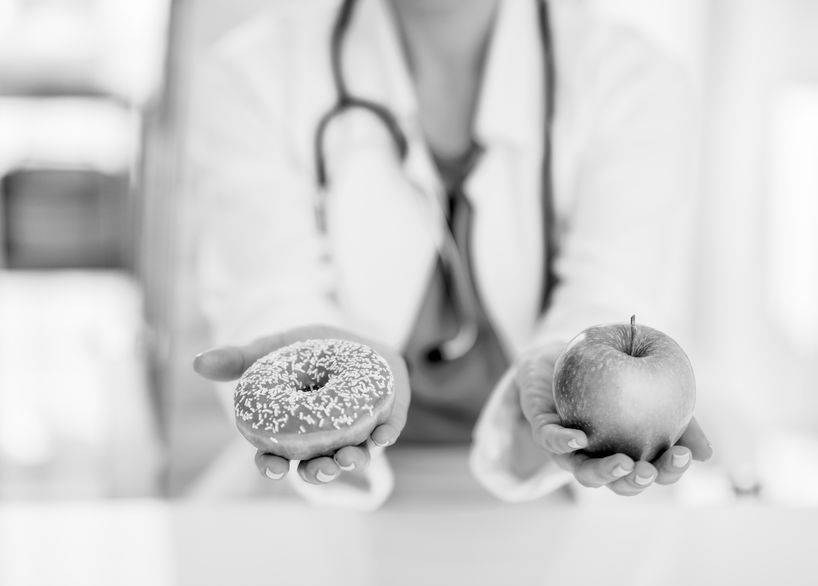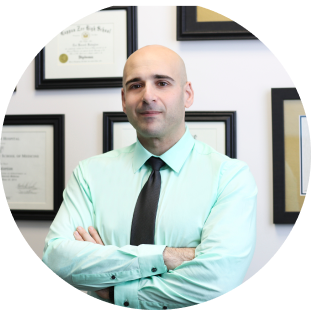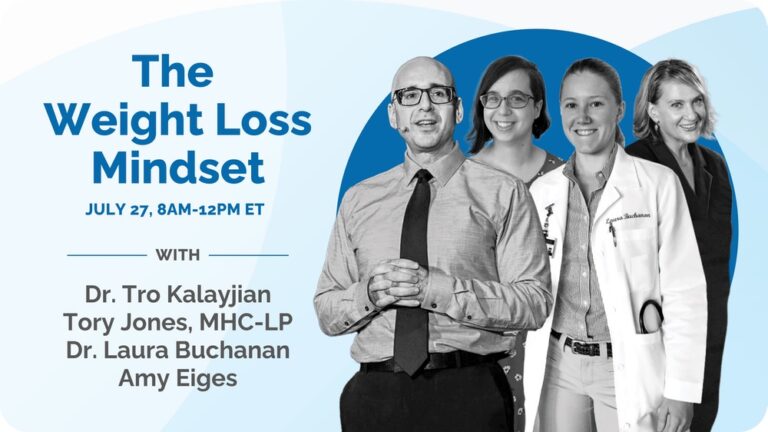By Dr. Tro Kalayjian
It’s Thursday night, and I’m sitting in an airplane, about to take off for New York. I’m heading home from Las Vegas after attending Obesity Week 2019, the world’s largest obesity medicine conference, a collaboration between The Obesity Society and The American Society of Metabolic and Bariatric Surgeons.
I don’t quite know how to express my feelings and thoughts about this event, but the words ‘anger’ and ‘hopelessness’ immediately come to mind. My anger and hopelessness are best exemplified by the first keynote speech, delivered by Dr. William Cefalu, who is chief scientific and medical officer of the American Diabetes Association.
 After accurately describing our country’s spiralling healthcare costs, and the morbidity and mortality associated with diabetes and obesity, Dr. Cefalu went on to discuss the benefit of low-calorie approaches for diabetes reversal. He also highlighted bariatric surgery and medications. But ultimately, he harped on one point, that is frequently repeated at conventional obesity medicine conferences:
After accurately describing our country’s spiralling healthcare costs, and the morbidity and mortality associated with diabetes and obesity, Dr. Cefalu went on to discuss the benefit of low-calorie approaches for diabetes reversal. He also highlighted bariatric surgery and medications. But ultimately, he harped on one point, that is frequently repeated at conventional obesity medicine conferences:
“There is no best diet. The best diet is one that a patient can adhere to.”
I will explain why I question the merit of this statement, but first I’d like to highlight Dr. Cefalu’s bias by juxtaposing it with the statement that followed.
Dr. Cefalu stated that good diets should incorporate lean meat, whole grains, fruits and vegetables. Now, Dr. Cefalu specifically states that NO DIET is better than another, and yet he highlights a low-calorie approach to diabetes reversal, as well as a LOW-FAT approach to general nutrition. The “LEAN meat, whole grains, fruits and vegetables” diet he recommends make for a low-fat, high-carb diet.

Many may not see the bias in this statement, but it’s present. The bias is AGAINST low-carb approaches, despite Dr. Cefalu STATING that diet adherence should guide nutritional advice. And this sentiment that, “the best diet is one that a patient can adhere to” is rampant in fitness and healthcare circles. And yet the ONLY diet that has a biomarker for adherence is a low carbohydrate approach. The use of continuous glucose monitors (CGM) and ketone measurements provides short-term and long-term measures to assess adherence.
So, if adherence is the main issue in the diet wars, then low-carbohydrate and time-restriction (both ketogenic) approaches should be considered the BEST diets. Note that as someone who once weighed 350 pounds, I learned quite well how to gain weight on any diet. The statements that harp on dietary adherence are a half-hearted attempt to recognize the growing data of approaches like low carb and time restriction that pay little attention to the failed messaging of multiple small meals, lean meats, and whole grains. What these academics are doing is trying to adhere to the harmful legacy messaging of low-fat and calorie-counting approaches to weight loss and diabetes management, while somehow giving a caveat to low carb approaches by saying “there is no best diet” or “there is no diabetes diet.”
Why is it so hard for doctors to admit their failure? Why can they not let go of this legacy messaging? I think this was best exemplified with my interaction with Dr. Yoni Freedhoff. In his book, The Diet Fix, Freedhoff’s messaging relies heavily on the importance of eating breakfast, eating multiple meals throughout the day, counting calories, and tracking food, as well as avoiding restriction and embracing moderation
Unfortunately, it has become increasingly clear that these approaches are likely not helpful. Study after study supports the use of time-restricted feeding and intermittent fasting for diabetes and obesity. This stands in stark contrast to his recommendation to eat breakfast upon waking and eating five to seven meals per day.
During a presentation on fasting, I posed a question to the lecturer about adherence to fasting. I asked the presenter how she felt “the legacy messaging of eating multiple small meals affects the adherence of those looking to therapeutic fasting,” to which the lecturer essentially had no response.
Having read Yoni’s book, I mentioned I couldn’t help but think of him when asking this question. I also couldn’t help but think of my patients who have been consistently told by loved ones and healthcare providers to eat breakfast and snacks.
Unfortunately for these physicians—including Dr. Freedhoff, Dr. Cefalu and Dr. Creel—it seems the real issue is reconciling their bias and their mistakes. It’s easier for Yoni to say he will use any approach that works for his patients, than for him to admit that the premise of his book has been disproven. It’s a tough pill to swallow, and I don’t blame him.
How can he reconcile his desire as a doctor to help his patients with the idea that written in stone are these recommendations from Diet Fix that are potentially diabetogenic and obesogenic? I am not sure I would respond much differently.
Yoni has been exceedingly critical of Dr. Jason Fung, a pioneer and major proponent of therapeutic fasting. Could this be making it even harder for him to admit the premises in his book are wrong? I am not sure. But it seems like many of these physicians are having difficulties reconciling legacy messaging and current data.
Current data shows that low carbohydrate approaches are modestly superior to low-fat approaches, and that lower carbohydrate approaches are more effective for glycemia management.
Dr. Creel had similar messaging, championing ANY diet, but then emphasizing the importance of whole grains, lean meats and fruits. Dr. Creel cited DIETFITS, a 12-month study by Christopher D. Gardner. The study compared a healthy low-fat approach against a healthy low-carbohydrate approach to weight loss. Dr. Creel mentioned that this study shows that NO DIET is superior. Yet looking closely at the data shows that the three-month data and six-month data is statistically significant favoring low carb approaches.
The 12-month data also supported low carbohydrate approaches, but given patients were told to add back carbohydrates, the resulting difference in sugar between groups was only ONE TABLESPOON per day! These points were not mentioned.
After Dr. Creel focused on dietary adherence, he then stated that eating more fruits, lean meat and whole grains is preferable. But these are specifically low fat and low calorie, and incompatible with low-carbohydrate approaches. These two points by Creel simply cannot be reconciled.
I questioned him on this and he stated that there are issues with overeating fat and issues with saturated fat that need to be taken into account. I am left confused. Is a low carbohydrate, higher fat diet appropriate or not, Dr. Creel? You cannot have it both ways. You cannot pretend to support patient choice and champion dietary adherence, and simultaneously recommend low-calorie, low-fat, high-sugar food
Is questioning these paradigms really that difficult? It seems the legacy messaging is actually incompatible with new data supportive of a low-carbohydrate diet and time-restricted eating. The best attempts to assimilate this data is to focus on dietary adherence or the idea championed by Yoni that he would try anything that worked. But these seem half hearted, illogical, and likely irreconcilable.
This inability to reconcile low carb and intermittent fasting into the status quo was pervasive throughout the conference. In a lecture by Dr. Elaine Waxman, an interesting study was presented.
The study—Feeding America Intervention Trial for Health-Diabetes Mellitus (FAITH-DM)—took patients with diabetes and food insecurity, the most needy and desperate patients who are most likely to benefit from the legacy messaging of more fruits, grains and vegetables, and provided participants in the control arm with those foods. Despite literally giving grains, fruits and vegetables to patients with diabetes and poverty, there was no difference in glycemic excursions, A1c, or any endpoint.
These patients were MOST likely to benefit from sound nutrition and despite literally GIVING them what the guidelines call for, there was no impact on ANY outcome for diabetes or obesity. Grains, fruits and vegetables DID NOT help diabetes in the patients most likely to benefit from medical nutrition therapy.
This inability to reconcile new information, the inability to unanchor from the legacy harm, is only the tip of the iceberg. Another critical issue is an inability to listen to patients and to change our inherent beliefs.
Many dieticians I talked with, like Dr. Jacob Mey and Dr. Ashley Gearhardt, told me they believe food addiction is a complicated issue. They said patients often self describe as addicted to food but that in many cases food addiction may not be the accurate diagnosis. In fact, many other dieticians shared this belief.
Following Dr. Gearhardt’s lecture, one attendee said she believes “food addiction doesn’t exist.” She said she has many patients who “believe they are addicted”, but when asked how many days of ONLY ice cream they would eat, the patients respond that they would only eat ice cream for a few hours, not days. She believes this is evidence that they are not actually addicted.
Nobody WANTS to be addicted, but that doesn’t mean patients cannot recognize when they ARE addicted to a substance. Unfortunately these dieticians believe their knowledge of nutrition supersedes the direct statements and beliefs of their patients. Many nutritionists believe they have a greater understanding of the patient’s relationship to food than the patient does. They believe they know better.
These practitioners believe that mindfulness and intuitive eating is the way to deal with cravings. They don’t understand, nor do they care to learn about the hormonal and satiety benefits to low-carb and time-restricted approaches.
After one of the sessions, I talked to one of these dieticians about studies that have shown modern food leads to obesity and diabetes in rats, raccoons and crows. I rhetorically asked the dietician “Should those animals practice mindfulness? Should the raccoons be using intuitive eating or should they instead eat real food that leads to hormonal fullness?”
We listened to several lectures of the superadditive effects of sugar and fat. We listened to lectures about the hyperpalatable, processed foods being eaten in the order of 600 calories more per day. What drives this? Not energy. Could it be the combination of fat and sugar? Could it be these foods are hijacking our appetite and satiety mechanisms, and leading to obesity and diabetes… just like what happens to EVERY OTHER animal exposed to the same ice cream, chips, pizza and cheeseburgers?
The data is there, it has been presented, but will these dieticians let go of their legacy thinking that food addiction doesn’t exist? Will they be able to help these patients who are smacking them in the face with self-reports of food addiction? It seems unlikely for now.
These puzzle pieces seem to be hiding in plain sight. Several lectures mentioned the harms of sugar and sugar sweetened beverages. And yet low-carbohydrate approaches are glossed over in favor of low-calorie and low-fat diets, medications, and surgery. Why can’t these physicians put the puzzle pieces together?
Some believe in this false narrative of moderation. I say “false narrative” because the five most effective approaches for glycemia management are whole food plant based, very low carbohydrate ketogenic, intermittent fasting, low calorie, and surgery.
NONE of these are moderate approaches. Each of these approaches are remarkably efficacious, yet considered “extreme”. Dieticians and physicians continue to believe we should “portion control and employ moderation”. The evidence for efficacy DOES not support “portion control and moderation”, while seemingly it does support eating mostly real-food sources of meat and/or plants or just not snacking.
Is it possible these dieticians are concerned about the safety of so-called “extreme” or “restrictive” diets? Some practitioners falsely anchor to the idea that restrictive diets, like WFPB, Keto or IF may CAUSE an eating disorder. I have not seen any evidence in any of the interventional trial data on ANY diet that it causes an eating disorder.
While it is true that patients with disordered eating may be attracted to various diets, the idea that the diet will cause an eating disorder is preposterous. Especially if the diet focuses on real food, like WFPB, and Keto.
In a recent study, a real-food dietary intervention has been shown to reduce the symptoms of depression and anxiety, and there were no reports of an increased incidence of eating disorders. Ironically, it seems that well constructed, real food diets IMPROVE the symptoms of mental health, rather than CAUSE eating disorders. Could it be that dieticians and physicians are clinging to an idea that moderation is preferable, by literally making up this problem of causing eating disorders? I am not sure, but it’s clear that this unsupported belief is preventing practitioners from embracing fasting and the aforementioned diets.
In fact, when I mentioned to a member of a bariatric surgery group in the Mississippi area that many of my patients eat little to no carbs and typically eat less than six hours per day, they were shocked and said they believed “that’s an eating disorder”. Unfortunately, I was pulled away before I could tell them that my patients are quite happy with this way of eating and show absolutely no signs of mental despair or limited functioning. In fact, they feel less hungry and better overall.
This idea of moderation and inclusiveness is pervasive in the mainline of obesity management, but it is doing a huge disservice to patients. A colleague of mine, Dr. Spencer Nadolsky recently tweeted that “Some do great with 6 meals/day. Some do great with 3 meals/day.” Although I appreciate his willingness to accept various dietary paradigms, I wonder if this is fair to patients. If the point here is that six meals is equal to three meals, this has been disproven in the literature. In interventional trials, increased meal frequency and increased eating windows leads to worsening of diabetes and obesity.
There is a prevalent belief that intermittent fasting is difficult to adhere to because it is restrictive. The facts are quite different. When a patient changes the diet to eliminate sugar and processed carbs, and begins eating real foods, the desire to eat many meals throughout the day is drastically reduced. The patient is able to leverage his or her improved satiety without any feeling of restriction.
Our patients need to know that eating fewer meals offer benefits versus eating more meals. If Spencer’s point is that we shouldn’t impose nutrition rules on a patient who is otherwise succeeding… well then I completely agree with him. There are many individual variables we may not be aware of, and if a patient exhibits success with concrete biomarkers and body compositions, I think it’s safe to support them, as Nadolsky suggests.
Dr. Jim Johnson also echoed this point of individuality. After an amazing lecture highlighting the role of hyperinsulinemia in disease, he discussed his most recent study which involved assessing the response of human beta cells to various amino acids, fats, and carbohydrates. What he found was that some individuals’ pancreatic beta cells respond to fat production by releasing insulin. His conclusion, which I agree with, is that whatever dietary paradigm we recommend, we need to actively monitor individual responses, like insulin and glycemia.

In spite of the unfortunate state of affairs with respect to the medical community’s approach toward nutrition, my time at Obesity Week was not without bright spots. I would be remiss if I failed to mention the countless physicians, dieticians, and scientists who approached me at the event, commiserating about the status quo, excited to connect with other professionals working to undo the damage that’s been done by decades of bad advice and harmful guidelines.
I was floored by the number of people who told me how much they appreciate the Low Carb MD podcast that I co-host with Dr. Brian Lenzkes, Dr. Jason Fung, and Megan Ramos. Several doctors have started recommending the podcast to patients and even include the Low Carb MD Podcast in their patient handouts for obesity and diabetes. This brought me to tears. We are having an impact.
It was amazing to hear how many of the physicians I met whose lives had been changed for the better by Dr. Fung and his low-carb and fasting teachings. I also found it interesting, and somewhat encouraging, that few of them had ever even heard of Yoni Freedhoff.
On the final evening of the conference, I went out to dinner with a group of seven doctors, and we met with resident citizen lipidologist Dave Feldman at an exotic and chique steakhouse. Most of us ate steaks, some fasted. There was no bread, no heart-healthy whole grains, there were no 6-9 servings of fruits and vegetables. There were also no judgements. It was the perfect way to end a conference.
Dr. Tro Kalayjian is a physician who is board certified in Obesity Medicine and Internal Medicine. Dr. Tro’s Medical Weight Loss & Direct Primary Care is Rockland and Bergen County’s premier medical weight loss facility, with a focus on helping patients make drastic changes through lifestyle interventions. Visit www.doctortro.com/appointments/ or call 845-397-CURE to make an appointment.






